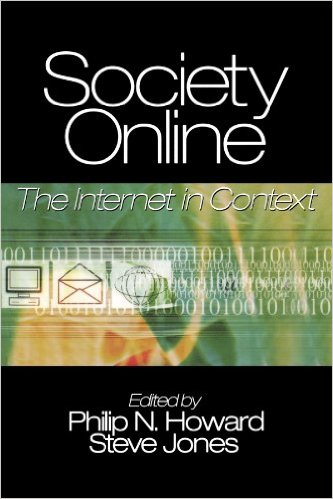
Professor Philip Howard
Professor of Internet Studies
Philip N. Howard is a professor of sociology, information, and international affairs. He is Director of the Programme on Democracy and Technology, and is a Professorial Fellow of Balliol College.

Within the developed world, much of society experiences political, economic, and cultural life through a set of communication technologies barely older than many citizens. Society Online: The Internet in Context examines how new media technologies have not simply diffused across society, but how they have rapidly and deeply become embedded in our organizations and institutions.
Society Online is not exclusively devoted to a particular technology, or specifically the Internet, but to a range of technologies and technological possibilities labeled “new media.” Rather than trying to cover every possible topic relating to new communication technologies, this unique text is organized by how these new technologies mediate the community, political, economic, personal, and global spheres of our social lives. Editors Philip N. Howard and Steve Jones explore the multiple research methods that are required to understand the embeddedness of new media.
Reviews
“These editors have the respect, visibility, and track-record to make this volume a contribution to the field of Internet studies. It will be adopted as an upper-division text and can also serve as a valuable reference work for doctoral students. Given its broad mix of qualitative and quantitative approaches, this work should have wide appeal across the Social Sciences and Information Studies.” (Sandra J. Ball-Rokeach)
“Society Online is an ambitious collection of articles, delivering the next generation of careful but eloquent studies of Internet use and culture. Both accessible and varied treatments, rich array of methodological approaches, intriguing data and provocative thought frameworks await the reader who would be curious to see if the internet context is already converging on some stability or still oscillating in search of its impacts and identity.”
(Sheizaf Rafaeli 2004-08-04)
“This is perhaps one of the most rigorously researched collections about online interactions and culture. The essays, based on a major initiative by the Pew Foundation, integrate data from other projects, such as the General Social Survey… The book is atheoretical, engaging little of technology studies, whether social construction of technology, actor-network theory, or others.”
(J.L. Croissant CHOICE)
About the Authors
Philip N. Howard is a professor of sociology, information and international affairs. He teaches at Oxford University and is a Fellow at the Tow Center for Digital Journalism at Columbia University. He writes about information politics and international affairs, and he is the author of eight books, including The Managed Citizen, the Digital Origins of Dictatorship and Democracy, and now Pax Technica: How the Internet of Things May Set Us Free or Lock Us Up. He has won multiple “best book” awards, and his research and commentary writing has been featured in the New York Times, Washington Post, and many international media outlets. Howard holds a Ph.D. from Northwestern University, where he studied how U.S. politicians use the internet to market their brand and manipulate public opinion.
Steve Jones is professor and head of the Department of Communication at the University of Illinois at Chicago. He is author/editor of numerous books, including Doing Internet Research, The Encyclopedia of New Media, CyberSociety, and Virtual Culture. He is co-founder and president of the Association of Internet Researchers and co-editor of New Media & Society, an international journal of research on new media, technology, and culture. He also edits New Media Cultures, a series of books on culture and technology for Sage Publications, and Digital Formations, a series of books on new media for Peter Lang Publishers.